Abstract
The Sixty-Seventh World Science Fiction Convention (WorldCon) in August 2009 featured a panel titled “Death, Illness and Disability in Fantasy and Science Fiction.” The session was absolutely packed with fans, many of whom identified as persons with disabilities. Throughout the too-brief hour, people shared stories of identifying with specific disabled (or bodily limited) characters and insightfully critiqued the technologies imagined within various science fiction (SF) scenarios. At the time, as a newcomer to the unique world of SF fandom, I was struck by the communal desire to discuss disability as it is represented in SF. Once the panel was finished and we were politely reminded to vacate the room, I knew that I wanted to keep the conversation going. Since then, I have repeatedly encountered a SF community—both academic and fan1—eager to engage with questions of dis/ability, as well as embodiment and identity, for people with disabilities.
Access this chapter
Tax calculation will be finalised at checkout
Purchases are for personal use only
Preview
Unable to display preview. Download preview PDF.
Works Cited
Attebery, Brian. Decoding Gender in Science Fiction. New York: Routledge, 2002. Print.
Avatar. Dir. James Cameron. Twentieth Century Fox, 2009. Film.
Barr, Marlene. Lost in Space: Probing Feminist Science Fiction and Beyond. Chapel Hill: U of North Carolina P, 1993. Print.
Bould, Mark. The Routledge Companion to Science Fiction. London: Routledge, 2009. Print.
Davis, Lennard. Bending Over Backwards: Disability, Dismodernism, and Other Difficult Positions. New York: New York UP, 2002. Print.
—. “Stumped by Genes: Lingua Gataca, DNA, and Prosthesis.” The Prosthetic Impulse: From a Posthuman Present to a Biocultural Future. Ed. Marquard Smith and Joanne Morra. Cambridge: MIT Press, 2006. 91–106. Print.
Garland-Thomson, Rosemarie. Staring: The Way We Look. Oxford: Oxford UP, 2009. Print.
Graham, Elaine. Representations of the Post/Human: Monsters, Aliens, and Others in Popular Culture. New Brunswick: Rutgers UP, 2002. Print.
Gunn, James E. “Towards a Definition of Science Fiction.” Speculations on Speculation: Theories of Science Fiction. Ed. James E. Gunn and Matthew Candelaria. Lanham, MD: Scarecrow Press, 2005. 5–12. Print.
Hopkinson, Nalo. “Nalo Hopkinson: Fantasy Island Girl.” What’s a Black Critic to Do?: Interviews, Profiles and Reviews of Black Writers. By Donna Bailey Nurse. Toronto: Insomniac Press, 2003. 139–45. Print.
Iron Man 3. Dir. Shane Black. Paramount Pictures, 2013. Film.
Kincaid, Paul. “On the Origins of Genre.” Speculations on Speculation: Theories of Science Fiction. Ed. James E. Gunn and Matthew Candelaria. Lanham, MD: Scarecrow Press, 2005. 41–54. Print.
“The Menagerie.” Star Trek: The Original Series. Dirs. Marc Daniels and Robert Butler. 1966. Paramount Home Entertainment, 2004. DVD.
Moore, Jean, and Mary Kosut. “Introduction: Not Just the Reflexive Reflex. Flesh and Bone in the Social Sciences.” The Body Reader. Ed. Jean Moore and Mary Kosut. New York: New York UP, 2010. 1–26. Print.
Peace, William J. “Slippery Slopes: Media, Disability, and Adaptive Sports.” The Body Reader. Ed. Jean Moore and Mary Kosut. New York: New York UP, 2010. 332–44. Print.
Quayson, Ato. Aesthetic Nervousness: Disability and the Crisis of Representation. New York: Columbia UP, 2007. Print.
Russ, Joanna. “Speculations: The Subjunctivity of Science Fiction.” To Write like a Woman: Essays in Feminism and Science Fiction. Ed. Joanna Russ. Bloomington: Indiana UP, 2005. 15–25. Print.
Shelley, Mary. Frankenstein. New York: Bantam Books, 1991. Print.
Shildrick, Margrit. Embodying the Monster: Encounters with the Vulnerable Self. London: SAGE Publications, 2002. Print.
Siebers, Tobin. Disability Theory. Ann Arbor: U of Michigan P, 2008. Print.
Smith, Marquard. “The Vulnerable Articulate: James Gillingham, Aimee Mullins, and Matthew Barney.” The Prosthetic Impulse: From a Posthuman Present to a Biocultural Future. Ed. Marquard Smith and Joanne Morra. Cambridge: MIT Press, 2006. 43–72. Print.
Snyder, Sharon L., and David T. Mitchell. Cultural Locations of Disability. Chicago: U of Chicago P, 2006. Print.
Source Code. Dir. Duncan Jones. Summit Entertainment, 2011. Film.
Star Trek. Dir. J. J. Abrams. Paramount Pictures, 2009. Film.
Star Trek: Into Darkness. Dir. J. J. Abrams. Paramount Pictures, 2013. Film.
Vint, Sherryl. Bodies of Tomorrow: Technology, Subjectivity, Science Fiction. Toronto: Columbia UP, 2007. Print.
Wendell, Susan. “Feminism, Disability, and Transcendence of the Body.” The Rejected Body: Feminist Philosophical Reflections on Disability. New York: Routledge, 1996. 165–79. Print.
Westfahl, Gary. “Introduction: Masters of the Literary Universe.” Science Fiction, Canonization, Marginalization and the Academy. Ed. Gary Westfahl and George Slusser. Westport: Greenwood Press, 2002. 1–6. Print.
Editor information
Copyright information
© 2013 Kathryn Allan
About this chapter
Cite this chapter
Allan, K. (2013). Introduction. In: Allan, K. (eds) Disability in Science Fiction. Palgrave Macmillan, New York. https://doi.org/10.1057/9781137343437_1
Download citation
DOI: https://doi.org/10.1057/9781137343437_1
Publisher Name: Palgrave Macmillan, New York
Print ISBN: 978-1-349-46568-2
Online ISBN: 978-1-137-34343-7
eBook Packages: Palgrave Literature CollectionLiterature, Cultural and Media Studies (R0)

